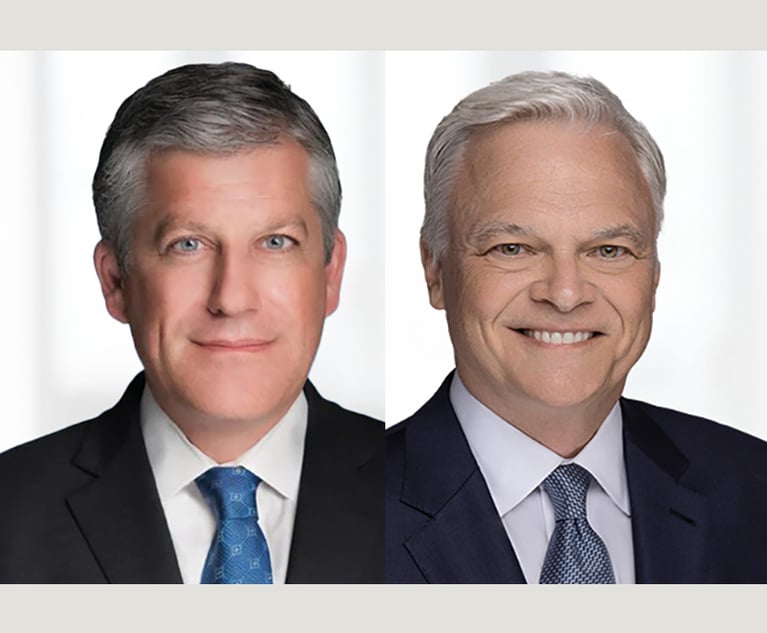 Aakash Patel of Flaster Greenberg. Courtesy photo
Aakash Patel of Flaster Greenberg. Courtesy photo The Demise of 'Chevron' and Its Effect on IP and Its Governing Agencies
What does a landmark change in administrative law mean for the USPTO and the ITC? As with any shift in the law, it will take time to know for sure. So, more of the same—at least for now. But challenges and creative arguments to overturn "problematic" agency interpretations are likely forthcoming.
September 16, 2024 at 12:26 PM
8 minute read
For many, the demise of Chevron—the doctrine by which agencies enjoy deference in interpreting ambiguous statutes—has long been coming. While Chevron's demise, and the resulting resurgence of Skidmore, is likely to lead to numerous challenges to previous agency decisions, its effect on intellectual property, namely patent law may be limited. Yet certain decisions by both the U.S. Patent and Trademark Office (USPTO), and its Patent Trial and Appeals Board (PTAB), and the U.S. International Trade Commission (ITC) have been afforded Chevron deference, and thus may be subject to post-Chevron challenges. This article examines three such examples: the ITC's interpretation of 19 U.S.C. Section 1337 (Section 337) in Suprema v. International Trade Commission; Director Kathi Vidal's guidance on discretionary denials at the PTAB; and the USPTO's proposed rule change for terminal disclaimers.
Chevron's Demise and Skidmore's Resurgence
In Loper Bright Enterprises v. Raimondo, the U.S. Supreme Court overruled the longstanding Chevron deference standard, whereby courts defer to "permissible" agency interpretations of a statute if the statute is silent or ambiguous and Congress did not address the issue. Instead, courts must exercise "independent judgment" to decide whether an agency has acted within their statutory authority, rather than defer to an agency's interpretation of an ambiguous statute. Importantly, Loper did not blanketly overrule agency deference all together. Rather, it marked the resurgence of Skidmore.
NOT FOR REPRINT
© 2025 ALM Global, LLC, All Rights Reserved. Request academic re-use from www.copyright.com. All other uses, submit a request to [email protected]. For more information visit Asset & Logo Licensing.
You Might Like
View All
'Taking the Best' of Both Firms, Ballard Spahr and Lane Powell Officially Merge
6 minute read

Law Firms Mentioned
Trending Stories
- 1Ex-Kline & Specter Associate Drops Lawsuit Against the Firm
- 2Am Law 100 Lateral Partner Hiring Rose in 2024: Report
- 3The Importance of Federal Rule of Evidence 502 and Its Impact on Privilege
- 4What’s at Stake in Supreme Court Case Over Religious Charter School?
- 5People in the News—Jan. 30, 2025—Rubin Glickman, Goldberg Segalla
Who Got The Work
J. Brugh Lower of Gibbons has entered an appearance for industrial equipment supplier Devco Corporation in a pending trademark infringement lawsuit. The suit, accusing the defendant of selling knock-off Graco products, was filed Dec. 18 in New Jersey District Court by Rivkin Radler on behalf of Graco Inc. and Graco Minnesota. The case, assigned to U.S. District Judge Zahid N. Quraishi, is 3:24-cv-11294, Graco Inc. et al v. Devco Corporation.
Who Got The Work
Rebecca Maller-Stein and Kent A. Yalowitz of Arnold & Porter Kaye Scholer have entered their appearances for Hanaco Venture Capital and its executives, Lior Prosor and David Frankel, in a pending securities lawsuit. The action, filed on Dec. 24 in New York Southern District Court by Zell, Aron & Co. on behalf of Goldeneye Advisors, accuses the defendants of negligently and fraudulently managing the plaintiff's $1 million investment. The case, assigned to U.S. District Judge Vernon S. Broderick, is 1:24-cv-09918, Goldeneye Advisors, LLC v. Hanaco Venture Capital, Ltd. et al.
Who Got The Work
Attorneys from A&O Shearman has stepped in as defense counsel for Toronto-Dominion Bank and other defendants in a pending securities class action. The suit, filed Dec. 11 in New York Southern District Court by Bleichmar Fonti & Auld, accuses the defendants of concealing the bank's 'pervasive' deficiencies in regards to its compliance with the Bank Secrecy Act and the quality of its anti-money laundering controls. The case, assigned to U.S. District Judge Arun Subramanian, is 1:24-cv-09445, Gonzalez v. The Toronto-Dominion Bank et al.
Who Got The Work
Crown Castle International, a Pennsylvania company providing shared communications infrastructure, has turned to Luke D. Wolf of Gordon Rees Scully Mansukhani to fend off a pending breach-of-contract lawsuit. The court action, filed Nov. 25 in Michigan Eastern District Court by Hooper Hathaway PC on behalf of The Town Residences LLC, accuses Crown Castle of failing to transfer approximately $30,000 in utility payments from T-Mobile in breach of a roof-top lease and assignment agreement. The case, assigned to U.S. District Judge Susan K. Declercq, is 2:24-cv-13131, The Town Residences LLC v. T-Mobile US, Inc. et al.
Who Got The Work
Wilfred P. Coronato and Daniel M. Schwartz of McCarter & English have stepped in as defense counsel to Electrolux Home Products Inc. in a pending product liability lawsuit. The court action, filed Nov. 26 in New York Eastern District Court by Poulos Lopiccolo PC and Nagel Rice LLP on behalf of David Stern, alleges that the defendant's refrigerators’ drawers and shelving repeatedly break and fall apart within months after purchase. The case, assigned to U.S. District Judge Joan M. Azrack, is 2:24-cv-08204, Stern v. Electrolux Home Products, Inc.
Featured Firms
Law Offices of Gary Martin Hays & Associates, P.C.
(470) 294-1674
Law Offices of Mark E. Salomone
(857) 444-6468
Smith & Hassler
(713) 739-1250






